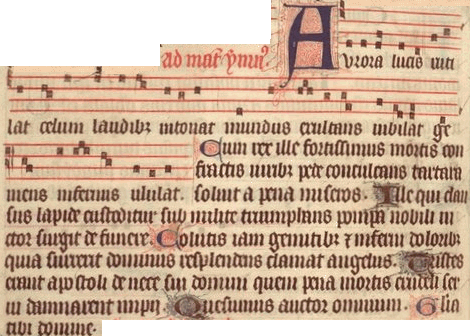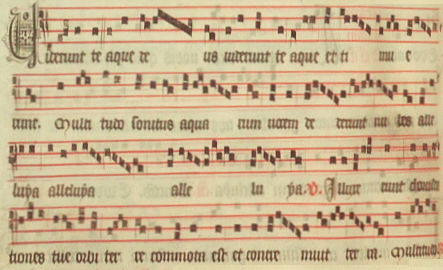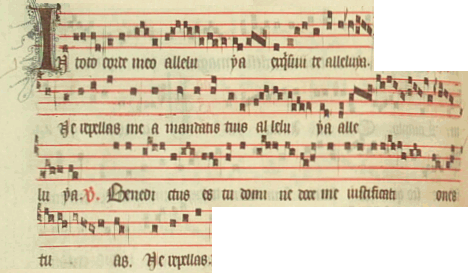Even Years: Didymus of Alexandria, Treatise on the Most Holy Trinity, Book 2:12 (PG 39, 667-674)
| Ἀνακαινίζει
τοίνυν ἡμᾶς τὸ ἅγιον
Πνεῦμα ἐν τῷ
βαπτίσματι, ὡς
Θεὸς, σὺν τῷ
Πατρὶ καὶ τῷ Υἱῷ,
καὶ ἀπὸ τοῦ ἀκαλλοῦς
εἰς τὸ πρεσβύτερον
ἀνάγει κάλλος,
καὶ τῆς ἑαυτοῦ
πίμπλησιν χάριτος,
ὡς μηδὲν ἔτι τῶν
ἀνεράστων δύνασθαι
χωρεῖν· καὶ ἐλευθεροῖ
ἀπὸ τῆς ἁμαρτίας
καὶ τοῦ θανάτου·
καὶ ἀπὸ χοϊκῶν,
ὅ ἐστιν ἀπὸ γῆς
καὶ σποδοῦ,
ποιεῖ
πνευματικοὺς,
καὶ μετόχους
θείας δόξης, καὶ
υἱοὺς καὶ
κληρονόμους τοῦ
Θεοῦ καὶ Πατρὸς,
συμμόρφους τε
τῆς εἰκόνος τοῦ
Υἱοῦ, καὶ
συγκληρονόμους
αὐτοῦ, καὶ ἀδελφοὺς
συνδοξασθησομένους
καὶ συμβασιλεύσοντας
αὐτῷ· καὶ ἀντὶ
γῆς πάλιν δωρεῖται
τὸν οὐρανὸν, καὶ
τὸν παράδεισον
ἀφθόνως χαρίζεται·
καὶ ἀγγέλων ἤδη
ποιεῖ τιμιωτέρους·
καὶ τοῖς θείοις
τῆς κολυμβήθρας
ῥείθροις τὴν τοσαύτην
τῆς γεέννης ἄσβεστον
κατασβέννυσι
φλόγα.
| The Holy Spirit renews us in Baptism through his Godhead, which he shares with the Father and the Son. Finding us in a state of deformity, the Spirit restores our original beauty and fills us with his grace, leaving no room for anything unworthy of our love. The Spirit frees us from sin and death, and changes us from the earthly men we were, made of dust and ashes, into spiritual men, sharers in the divine glory, sons and heirs of God the Father, who bear a likeness to the Son and are his coheirs and his brothers, destined to reign with him and to share his glory. In place of earth the Spirit reopens heaven to us and gladly admits us into Paradise, giving us even now greater honour than the angels, and by the holy waters of Baptism extinguishing the unquenchable fires of hell.
| | Διτταὶ
γὰρ γίνονται
κυήσεις ἀνθρώποις,
ἡ μὲν ἐκ σώματος
ἡμετέρου, ἡ δὲ ἐκ
τοῦ θείου Πνεύματος.
Περὶ δὲ τούτων
οἰκείως ἔγραψαν
δογματικοὶ ἄνδρες·
παραγράψω δ' ἑκάστου
τό τε ὄνομα καὶ αὐτὸ
τὸ διήγημα.
| We have two conceptions: to the human body we owe our first conception; to the divine Spirit, our second.
| | Ἰωάννης·
Ὅσοι δὲ ἔλαβον
αὐτὸν, ἔδωκεν αὐτοῖς
ἐξουσίαν τέκνα
Θεοῦ γενέσθαι,
τοῖς πιστεύουσιν
εἰς τὸ ὄνομα αὐτοῦ
οἳ οὐκ ἐξ αἱμάτων,
οὐδὲ ἐκ θελήματος
σαρκὸς, οὐδὲ ἐκ
θελήματος ἀνδρὸς,
ἀλλ' ἐκ Θεοῦ ἐγεννήθησαν.
Ὅσοι, φησὶν, ἐπίστευσαν
εἰς τὸν Χριστὸν,
ἐδέξαντο ἐξουσίαν
τέκνα Θεοῦ γενέσθαι,
τοῦτ' ἔστιν τοῦ ἁγίου
Πνεύματος, καὶ
συγγένειαν κτήσασθαι
πρὸς τὸν Θεὸν, ἧς
οὐκ ἠξιώθησαν ἄγγελοι.
Δηλῶν γὰρ, ὅτι ὁ
γεννῶν Θεὸς τὸ ἅγιον
Πνεῦμά ἐστιν, ἐπήγαγεν
ἀπὸ τοῦ Χριστοῦ·
Ἀμὴν, ἀμὴν λέγω
σοι· ἐὰν μή τις
γεννηθῇ ἐξ ὕδατος
καὶ Πνεύματος,
οὐ δύναται εἰσελθεῖν
εἰς τὴν βασιλείαν
τοῦ Θεοῦ
| John says: To all who received him, who believed in his name, he gave power to become children of God; who were born not of blood nor of the will of the flesh, nor of the will of man, but of God. All who believed in Christ, he says, received power to become children of God, that is, of the Holy Spirit, and to gain kinship with God. To show that their parent was God the Holy Spirit, he adds these words of Christ: I give you this solemn warning, unless one is born of water and the Spirit he cannot enter the kingdom of God.
| | Ὁρατῶς
μὲν γὰρ τὸ ὁρατὸν
ἡμῶν σῶμα, ἱερέων
διακονουμένων
ἡ κολυμβήθρα τίκτει·
νοητῶς δὲ, σῶμα ὁμοῦ
καὶ ψυχὴν, ἀγγέλων
ὑπηρετουμένων,
τὸ πάσαις νοήσεσιν
ἀόρατον Πνεῦμα
τοῦ Θεοῦ βαπτίζει
εἰς ἑαυτὸ καὶ ἀναγεννᾷ.
| Visibly, through the ministry of priests, the font gives symbolic birth to our visible bodies. Invisibly, through the ministry of angels, the Spirit of God, whom even the mind's eye cannot see, baptizes into himself both our souls and bodies, giving them a new birth
| | Καὶ γὰρ
καὶ Βαπτιστὴς ἱστορικῶς,
καὶ ἑπομένως τῷ,
Ἐξ ὕδατος καὶ
Πνεύματος, εἶπεν
περὶ τοῦ
Χριστοῦ· Ἐκεῖνος
ὑμᾶς βαπτίσει ἐν
Πνεύματι ἁγίῳ
καὶ πυρί. Ὀστράκινον
γὰρ ὃν τὸ ἀνθρώπειον
σκεῦος, δεῖται πρότερον
τοῦ ἀπὸ ὕδατος
καθαρσίου, εἶτα
καὶ τοῦ στερέμνιον
αὐτὸ ἀποτελοῦντος
νοητοῦ πυρὸς ὁ
γὰρ Θεὸς πῦρ
καταναλίσκον,
καὶ οὕτω τοῦ ἀπαρτίζοντος
καὶ ἀνακαινίζοντος
ἁγίου Πνεύματος·
ὁπότε οἶδεν τό
τε πῦρ τὸ
πνευματικὸν
καὶ ἀρδεύειν, τό
τε ὕδωρ καὶ ἀναχωνεύειν.
| Speaking quite literally, and also in harmony with the words, of water and the Spirit, John the Baptist says of Christ: He will baptize you with the Holy Spirit and with fire. Since we are only vessels of clay, we must first be cleansed in water and then hardened by spiritual fire - for God is a consuming fire. We need the Holy Spirit to perfect and renew us, for the fire of the Spirit can also wash us and the water of the Spirit can also melt us down and recast us.
|
Odd Years: Augustine of Hippo, Treatise 1 on 1 John, 9,12 (SC 75, 132-144)
| In hoc, inquit, cognoscimus eum, si mandata eius seruauerimus. quae mandata?... qui autem seruauerit, inquit, uerbum eius uere in hoc perfecta est dilectio dei. uideamus ne ipsum mandatum
dilectio uocetur adtende euangelium si non hoc est mandatum: mandatum,
inquit, nouum do uobis ut uos inuicem diligatis. in hoc cognoscimus quia in
ipso sumus, si in ipso perfecti fuerimus. perfectos in dilectione uocat. quae
est perfectio dilectionis? et inimicos diligere et ad hoc diligere ut sint
fratres sic dilige inimicos ut in societatem tuam uocentur. sic enim dilexit
ille qui in cruce pendens ait: pater ignosce illis quoniam nesciunt quid
faciunt mortem sempiternam ab eis expellebat prece misericordissima et
potentia praestantissima. multi ex eis crediderunt, et dimissus est eis sanguis
fusus christi. primo fuderunt cum saeuirent; biberunt cum crederent. in hoc
cognoscimus quia in ipso sumus, si in ipso perfecti fuerimus. de ipsa
perfectione diligendorum inimicorum dominus admonens ait: estote ergo uos
perfecti sicut pater uester caelestis perfectus est
| This is the test by which we can be sure that we know God, says St John: Do we keep his commandments? But which commandments? The person who keeps God's word divine love has reached perfection. May we not infer from this that God's actual commandment is to love? You have only to turn to the Gospel for confirmation. I give you a new commandment, Jesus says; love one another. We can know we are abiding in God if we have been made perfect in him—perfect, that is, in love. The perfection of love is to love one's enemies, and so transform them into brothers.
Our love must not be merely natural affection. We must love our enemies with the kind of love that longs to have them as brothers and to welcome them into our community. Such love was shown by the Lord as, hanging on the cross, he said: Father, forgive them, for they do not know what they are doing. By this prayer, so full of compassion, and by his own mighty power, he was saving them from everlasting death. Many among them believed, and received forgiveness for their part in shedding the blood of their Messiah. We can know, then, that we are abiding in God if we have been made perfect in him. When he says: Be perfect, as your heavenly Father is perfect, our Lord is calling us to the perfection which consists in loving one's enemies.
| | Qui diligit fratrem suum in
lumine manet, et scandalum in eo non est. qui sunt qui patiuntur scandalum aut
faciunt? qui scandalizantur in christo et in ecclesia. qui in christo
scandalizantur tamquam a sole uruntur; qui in ecclesia tamquam a luna. dicit
autem psalmus: per diem sol non uret te neque luna per noctem. id est si
tenueris caritatem, nec in christo scandalum patieris nec in ecclesia; nec
christum relinques nec ecclesiam. qui enim ecclesiam relinquit quomodo est in
christo qui in membris christi non est? quomodo est in christo qui in corpore
christi non est? illi ergo patiuntur scandalum qui relinquunt aut christum aut
ecclesiam
| He who loves his brother dwells in the light and has no occasion for stumbling. Those who either stumble themselves or are a cause of stumbling to others are those who are scandalized by Christ and by the Church. If you hold fast to charity you will find no stumbling block in either, nor will you abandon them. How can anyone be in Christ if he leaves the Church? No longer counted among Christ's members, he cannot be in Christ since he is not part of his body. Those who stumble, then, are the people who abandon Christ or the Church.
| | Videte enim quomodo passi sunt
scandalum tamquam a sole illi carnales quibus praedicabat carnem suam christus
et dicebat: qui non manducauerit carnem filii hominis et biberit sanguinem eius
non habebit in se uitam. septuaginta ferme homines dixerunt: durus est iste
sermo, et recesserunt ab eo. et remanserunt duodecim et ne forte putarent
homines quia ipsi praestant christo credendo in christum et non ab ipso illis
praestatur beneficium, cum duodecim remansissent ait illis dominus: numquid et
uos uultis ire (ut noueritis quoniam ego uobis sum necessarius, non uos mihi?)
illi autem quos non usserat sol responderunt ex uoce petri: domine, uerbum uitae
aeternae habes. quo ibimus?...
| See how scandalised were those carnal-minded people to whom Christ announced the giving of his flesh as food! When he told them: Anyone who does not eat the flesh of the Son of Man and drink his blood will not have life within him, well nigh seventy of them replied: This is an intolerable doctrine, and withdrew from his company, leaving only the twelve. And in case anyone should imagine that the latter were doing Christ a favour by believing in him, rather than receiving a grace from him, he said to the twelve who remained: Will you also go away? I want you to understand that it is you who need me, not I who need you. Peter spoke for them all when he replied: Lord, to whom can we go? You have the words of eternal life.
| | Quomodo ergo non est scandalum
in eo qui diligit fratrem? quia qui diligit fratrem tolerat omnia propter
unitatem quia in unitate caritatis est fraterna dilectio audi quid dominus
dicat: mandatum nouum do uobis ut uos inuicem diligatis. quid est lex nisi
mandatum? quomodo autem non patiuntur scandalum nisi dum sufferunt inuicem?
sicut paulus dicit: sufferentes inuicem in dilectione studentes seruare
unitatem spiritus in uinculo pacis. et quia ipsa est lex christi eundem audi
apostolum commendantem ipsam legem: inuicem, inquit, onera uestra portate et
sic inplebitis legem christi.
| [How is there no scandal in one who love hiss brother? He who loves his brother tolerates everything for the sake of unity, because brotherly love is included in the unity of charity. Hear what the Lord says: "I give you a new commandment, to love one another." What is the law, but a commandment? How can they avoid scandal, except by bearing with one another? That is as Paul says: "Bearing with one another in love, careful to preserve unity of the Spirit in the bond of peace" (Eph 4:2-3). This is the same as the law of Christ, as the Apostle commends the same law: "Carry one another's burdens, and in this way you will fulfil the Law of Christ" (Gal 6:2).]
|
| |




